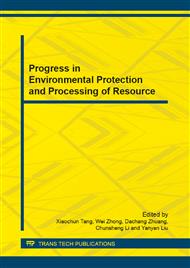p.1840
p.1846
p.1850
p.1857
p.1862
p.1866
p.1870
p.1876
p.1880
The Basic Framework System and Connotation of Chinese Water Culture
Abstract:
At present, water environment pollution and unsafe drinking water is a serious problem,only depending on technology difficult to solve,need for finding ways from cultural perspective. Chinese water culture construction can be roughly divided into four stages, Chinese water culture connotation is analysed, the basic framework system of water culture is puts forward. The basic characteristics of water culture is the cultural relations between human and water based on the water cycle as foundation,the water as the carrier,the water engineering as object. The main body of water culture includes water conservancy culture and water supply and drainage culture,the current water culture construction ignores water supply and drainage culture. Establish the two-stage water culture education system includes the general public and water professionals based on the core of drinking water security concept,which plays a key role in improving the water environment and unsafe drinking water, especially in rural areas.
Info:
Periodical:
Pages:
1862-1865
Citation:
Online since:
February 2013
Authors:
Price:
Сopyright:
© 2013 Trans Tech Publications Ltd. All Rights Reserved
Share:
Citation:


